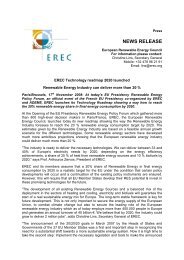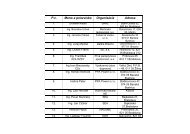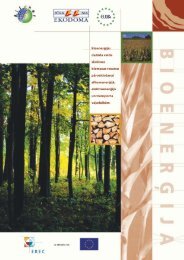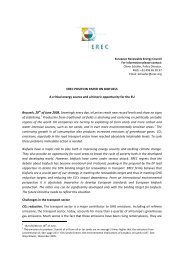CTO Assessment - European Commission
CTO Assessment - European Commission
CTO Assessment - European Commission
Create successful ePaper yourself
Turn your PDF publications into a flip-book with our unique Google optimized e-Paper software.
FISCHER<br />
the first factory worldwide<br />
supplied by a tri-generation<br />
biomass plant<br />
Contacts: Helmut Roithmayer • Scharoplan GmbH<br />
Rainerstraße • 4020 Linz • Austria • Tel: +43-732-668-009<br />
E-mail tb@scharoplan.co.at<br />
In February 2001 Fischer, the world market<br />
leader in ski and aeroplane components,<br />
opened a tri-generation biomass plant<br />
which supplies two production facilities<br />
with heating, cooling and electricity. Fischer<br />
became the first factory worldwide to have<br />
been able to cover its heat and cooling needs<br />
with such a system for the production process<br />
and regulation of the building temperature,<br />
as well as being provided with electricity<br />
by such a system.<br />
Main motivations<br />
For 30 years, Fischer had been using a<br />
steam boiler in conjunction with a back-up<br />
boiler, fired by heavy heating oil to supply<br />
the heat demands. This system was cheap<br />
but very environmentally unfriendly. When<br />
it came to replace the old system by a new<br />
system, the environmental concerns and the<br />
beliefs that renewable energy sources will<br />
become increasingly important in future<br />
convinced Fischer to invest in research and<br />
innovation and to become the first factory<br />
worldwide to be supplied by a tri-generation<br />
biomass plant.<br />
Project details<br />
Using the waste of the wood industry (in<br />
particular bark, woodchips and sawmill<br />
wastes) and the agricultural sector, the<br />
biomass source of energy is used to supply<br />
the total of heat and cooling needs, while<br />
covering an important part of the electricity<br />
needs too.<br />
20,000 m 3 of biomass are transported<br />
yearly by train to be brought to the Fischer<br />
production site. This is one third of the<br />
total amount of biomass needed for this<br />
plant.<br />
The 15-year contract signed between<br />
Scharoplan and Fischer shows long-term<br />
environmental and social commitments.<br />
Signed in 1999 it targets at using RE<br />
whenever possible, ensuring high security<br />
of supply and safety levels, reducing regional<br />
emissions and contributing to the<br />
Kyoto commitments, as well as creating<br />
socio-economic benefits for the region.<br />
The consultancy Scharoplan strongly believes<br />
that the expected development of a<br />
railway after the privatization of the train<br />
sector, should facilitate a larger proportion<br />
of biomass transportation by train.<br />
Main innovative aspects<br />
The “energy contracting” arrangement<br />
concluded between the Scharoplan consultancy<br />
and Fischer enabled "the combination<br />
of an innovative biomass installation<br />
with a modern financing scheme for the<br />
plant. The firm's own capital and external<br />
finance amounted 65%of the total investment<br />
amount that was 5 million euros. The<br />
rest was covered by subsidies from the<br />
<strong>European</strong> <strong>Commission</strong>, the national government<br />
and the federal state of Upper<br />
Austria.<br />
With this arrangement, Scharoplan owning<br />
and operating the plant, it sells the heat<br />
and electricity to Fischer to market price.<br />
Any electricity produced in excess of needs<br />
will be fed into the national network. If<br />
Fischer needs more electricity, it can buy it<br />
from the national grid.<br />
Amount of<br />
biomass used<br />
Enabling factors<br />
Biomass by-products were available from<br />
the nearby forestry and agricultural sectors,<br />
usually within a distance of 50 km,<br />
maximum 100 km.<br />
Challenges<br />
The main problems was to install the trigeneration<br />
plant without having to interrupt<br />
the production process of the Fischer<br />
factory. Hence, the main work had to be<br />
done during weekends or during periods<br />
when the production process was shut<br />
down anyway.<br />
Replication Potential<br />
Replication is dependent on the availability<br />
of biomass supply, as well as affected by<br />
the possibility to receive a subsidy.<br />
Number of jobs created<br />
The project created and preserved job, totalling<br />
around 100,000 person-hours during<br />
the planning and construction phases,<br />
and three person-years for the operation of<br />
the plant. Furthermore, the project generates<br />
additional income in the agricultural<br />
and forestry sectors, thus indirectly contributing<br />
to increase and preserve jobs<br />
thanks to the purchase of their waste byproducts<br />
by a new customer.<br />
Environmental target<br />
Fischer substitutes 3,000 tonnes of heavy<br />
heating oil per year and reduces CO 2<br />
emissions<br />
by 9,456 tonnes per year, among<br />
other emissions reduction.<br />
50,000 m 3 of bark, woodchips and sawmill wastes yearly<br />
replace the heavy heating oil used before.<br />
Overall Evaluation<br />
This project has been awarded the Energy<br />
Globe Award 2001 as an excellent example<br />
how a high-tech factory can fulfill its<br />
high quality energy needs with a biomass<br />
plant.<br />
Annual output<br />
Transport<br />
26,000 MWh of heat; 1,000 MWh of cooling, 2,000 MWh of<br />
power, and 1,500 MWh of thermal oil.<br />
a train connection for the environmentally friendly transport of<br />
fuel is needed.<br />
135 wagons and about 270LKWs are needed per year; 1/3 is<br />
by railway; 2/3 by road traffic.<br />
<strong>CTO</strong> - Showcase<br />
47



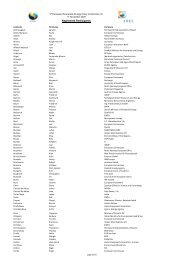
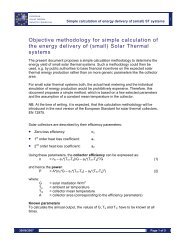
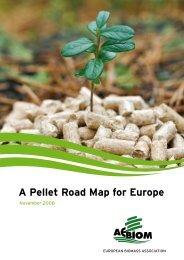
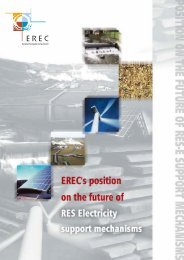
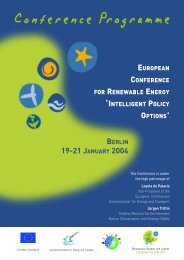
![Energy [R]evolution - Greenpeace](https://img.yumpu.com/47174859/1/184x260/energy-revolution-greenpeace.jpg?quality=85)
